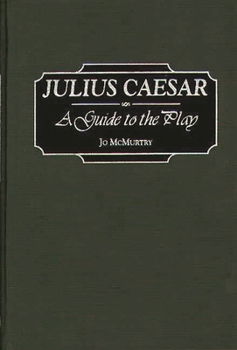Julius Caesar: A Guide to the Play
Perhaps more than any other single work, Shakespeare's Julius Caesar has popularized the image of Brutus as a ruthless and cowardly traitor, Caesar as a noble ruler and sympathetic victim, and the Ides of March as a time of danger and duplicity. On the surface, the play is comparatively simple and straightforward, and thus it has served to introduce generations of students to Shakespeare's works. But the play is deceptive in its apparent...
Format:Hardcover
Language:English
ISBN:0313304793
ISBN13:9780313304798
Release Date:October 1998
Publisher:Greenwood
Length:160 Pages
Weight:0.88 lbs.
Dimensions:0.7" x 6.4" x 9.6"
Customer Reviews
1 rating
Exquisite Ambiguity
Published by Thriftbooks.com User , 24 years ago
I consider this play by Shakespeare an exquisite masterpiece. This is a unique piece of literature in that we can see that life is not usually a battle between good and evil, but rather a battle between people with different views. Cassius and Caesar both have traits that present them as ambitious and dangerous. Yet, Shakespeare also leads us into having great sympathy for both of them at times. Cassius honestly fears that Caesar will be the terror of Rome. And yet, we can also understand that Caesar knows that to be an effective ruler, he must maintain a strong autocratic hold. Brutus is tricked into joining the conspiracy, but honestly feels that he is serving Rome, and even when things get difficult he holds on to the situation with both hands up until the very end. Mark Antony sees Caesar's death as the start of chaos in Rome and he does his absolute best to crush the conspiracy and restore order. It is interesting that rather than gloating over his victory he offers his respect to his defeated foe. But "Julius Caesar" also offers interesting psychological moments. While Cassius and Brutus are very different people, they manage to stick together through the consequences of their actions. Mark Antony shows himself to be a master of psychology when in 3.2, he wins over the multitude Brutus had won over moments earlier. (This is not an invention of Shakespeare's. It really happened.) It is also an interesting psychological aspect that Mark Antony first appears as little more than a servant to do Caesar's bidding. Yet, when Caesar is killed, Mark Antony clearly shows himself to be the most intelligent and able person in the play. He grabs control with both hands and uses it in a more effective manner than anyone. We must not neglect the women in the play either. The appearance of Caesar's wife is brief, but she clearly shows herself to be a loyal and devoted wife. Furthermore, this helps us see the domestic aspect of Caesar's tragedy. Also, the appearance of Brutus' wife helps us to see that Brutus' concern over Rome's well being has struck him so much that his domestic life has taken a back seat. Also, Shakespeare makes use of bad omens like the soothsayer who warns Caesar (as well as all of us) of the dangers to come. When the ghost of Caesar appears to haunt Brutus, it would seem that Caesar becomes to Brutus, what the soothsayer was to him. Finally, I can not overestimate the mastery of Shakespeare's writing when the first 3 acts lead up to the brutal slaying of Caesar. And, just when we think the worst has happened, Mark Antony delievers his soliloquy and makes it clear that the game has only started. In addition to the play, I highly suggest the old (1953) black and white movie where James Mason does Brutus and Marlon Brando does Mark Antony.




